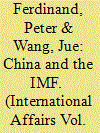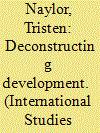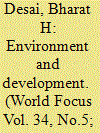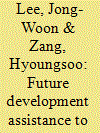| Srl | Item |
| 1 |
ID:
123984


|
|
|
|
|
| Publication |
2013.
|
| Summary/Abstract |
The International Monetary Fund was the international financial institution that was most alien to the Chinese government when it embarked upon its economic reforms at the end of the 1970s, because financial markets were neglected in China's centralized plan. Therefore, China's increasing cooperation with the IMF illuminates the extent to which China has changed through 'socialization' into the norms of global governance more generally.
The article examines the evolution of China's involvement with the IMF and argues that in many respects it has embraced those norms. Even though its political economy still substantially diverges from western prescriptions, many features are compatible with the (original) 'Washington Consensus'.
But China remains wary of becoming too dependent on possible IMF assistance; it tries to preserve its freedom of manoeuvre. Although the IMF has attempted to acknowledge China's growing global importance by increasing its voting rights, this has failed to keep pace with change in the global economy. China is thus attracted by the possibility of additional ways of pragmatically increasing its leverage over global decisions, for instance through regional financial cooperation in Asia.
|
|
|
|
|
|
|
|
|
|
|
|
|
|
|
|
| 2 |
ID:
103308


|
|
|
|
|
| Publication |
2011.
|
| Summary/Abstract |
This study examines how power operates within international development discourse and investigates its effects on development organizations and on individuals-donors and recipients of aid alike. It analyzes the narratives pertaining to Afghanistan that are (re)produced by five different types of development actors: a donor state, a recipient state, an international financial institution, an international organization, and a non-governmental organization. I argue that the operation of multiple, interrelated types of power has both ideational and material effects which manifest in development policies, programs, and projects. I demonstrate how these types of power operate discursively through a Politics of Pity which (re)creates and perpetuates hierarchical, coconstituted relationships between and among these actors, and which (re)constitutes the identities and abilities of actors.
|
|
|
|
|
|
|
|
|
|
|
|
|
|
|
|
| 3 |
ID:
120939


|
|
|
| 4 |
ID:
124583


|
|
|
|
|
| Publication |
2013.
|
| Summary/Abstract |
Purpose-This article explores multilateral engagement in the economic rehabilitation of North Korea, with particular focus on the establishment of special trust funds.
Design/methodology/approach-The study consists of an analysis of international assistance to North Korea that addresses policy measures for improving the quality of aid delivery. Conceptual and empirical issues around multi-donor trust funds (MDTFs) are explored by conducting an examination of the role of aid coordination, management practices in multilateral aid, and the potential benefits of trust funds.
Findings-The setting up of trust funds is a possible option for resource mobilization and aid coordination in the provision of development assistance to North Korea. Given the potential benefits of such an aid modality, the creation of one or more MDTFs as a means of facilitating the denuclearization process on the Korean Peninsula could help strengthen relations between Pyongyang and the international donor community. In drawing attention to issues around the administrative structure of the MDTF, this article proposes that international donors establish a North Korea Development Assistance Group (NKDAG) as the principal trust fund governing body.
Originality/value-This is the first policy-oriented study detailing the possible establishment of MDTFs in the North Korean context. The suggestions of the article could contribute to efforts of the international community to improve the transparency and effectiveness of its aid contribution to North Korea.
|
|
|
|
|
|
|
|
|
|
|
|
|
|
|
|